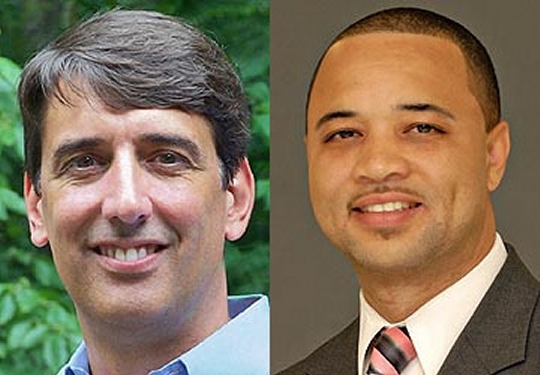 Sen. Guy Guzzone and Del. Antonio Hayes. (Photos: Md. State Archive)
Sen. Guy Guzzone and Del. Antonio Hayes. (Photos: Md. State Archive)Imagine showing up at your doctor's office to find a locked door and a "closed" sign. Or taking your child to her pediatrician only to be told she can't be seen.
As Marylanders, when we need healthcare, we expect to receive it. Mental health and substance use disorders—considered together as behavioral health—are no exception, but access to service can be challenging or frustrating for more than one million Marylanders who live with a behavioral health disorder.
Years of stagnant or reduced behavioral health budgets have jeopardized critical access to mental health and substance use disorder treatment. Without action, we fear that community health providers may close up shop, and Marylanders who urgently need behavioral health care will instead find closed doors or dead ends.
That's why we have sponsored the Keep the Door Open Act (SB497/HB595) in the General Assembly this year.
Family, friends and neighbors
We all know someone—a family member, a friend or a neighbor—who needs mental health or substance use treatment. These seemingly invisible illnesses are of particular concern to the most vulnerable Marylanders—children, veterans, the elderly and homeless.
The communities we each represent—suburban Howard County and Baltimore City—are very different but yet the needs of our constituents with regard to behavioral healthc are are the same: they need dependable access to treatment.
Behavioral health might not be a household name but it is a household need. Community health providers administer traditional outpatient services, mobile treatment, crisis services, withdrawal management, rehabilitation, residential treatment, vocational services and housing. And demand is increasing—use of our public behavioral health system increased 65% since the start of the "Great Recession" in December, 2007.
Providers left behind
Here's how it works. The state budget sets the reimbursement rates for providers that are funded by Medicaid or grant funds through the state's Behavioral Health Administration. Over the past 20 years, these rates have only had six modest increases, while the cost of living—and medical inflation—have risen consistently and dramatically.
Behavioral health providers are being left behind, and many are in danger of reducing or eliminating services.
Fortunately, Gov. Larry Hogan included a modest 2% increase in this year's proposed budget. That is welcome news for this year's budget, but the need to ensure our treatment providers can keep up with increasing demand remains. As legislators, we know that the state budget is often a contentious issue and we can ill-afford to fight every year to try to get a percent or two increase in the rates.
The Keep the Door Open Act will address this problem by linking our community health provider rates to the consumer price index for medical care in the Baltimore-Washington, D.C. area.
This means that providers can hire and retain qualified staff, and better plan for a future that includes increasing demand for treatment, especially in light of the current heroin crisis affecting our state.
Treatment works and makes economic sense
We know behavioral health treatment works, and we need to make it more accessible. A Maryland Department of Health and Mental Hygiene report concluded that it is "effective in reducing symptoms and improving functionality for the majority of people who receive treatment."
Dependable behavioral health care also makes economic sense. If Marylanders cannot receive the behavioral health services they need, studies show they often end up receiving costlier emergency room or inpatient care. Or worse, they may forego treatment entirely, worsening their condition or creating a medical crisis for themselves.
We're proud of the Keep the Door Open Act and believe now is the time for Maryland to ensure dependable access to community health providers. Our most vulnerable Marylanders should find open arms, not closed doors, when they need help.
Guy Guzzone is a member of the Maryland Senate representing District 13 in Howard County. Antonio Hayes is a member of the House of Delegate representing District 40 in Baltimore.
There will be a rally for the bill on Thursday at noon in Lawyer's Mall at the State House.

